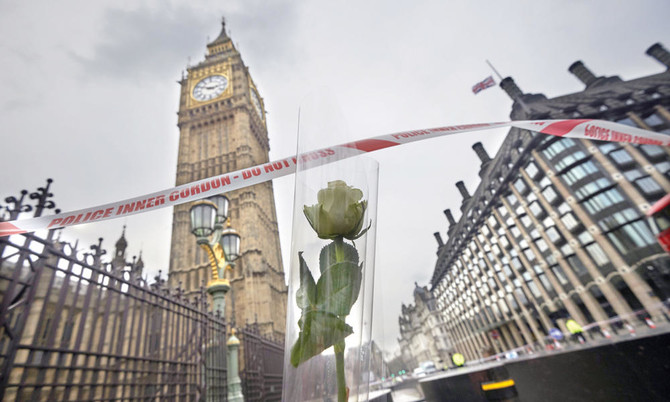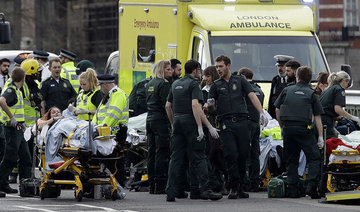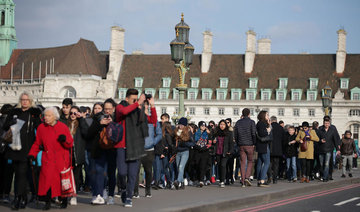LONDON: Experts have warned of the threat posed by “low-tech” terror attacks, following Wednesday’s deadly rampage outside the UK Parliament and questions over another incident in Antwerp.
The London attacker — who mowed down two civilians with his car and stabbed a policeman before being shot dead — was on Thursday named as British-born Khalid Masood.
Daesh claimed responsibility for the attack in a statement issued by its Amaq news agency, but did not name Masood and gave no details.
“Masood was not the subject of any current investigations and there was no prior intelligence about his intent to mount a terrorist attack,” London’s Metropolitan Police said in a statement.
“However, he was known to police and has a range of previous convictions for assaults, including GBH (grievous bodily harm), possession of offensive weapons and public order offenses.”
Prime Minister Theresa May told Parliament the attacker had once been investigated by the MI5 intelligence agency over concerns about violent extremism, but was a peripheral figure. About 40 people were injured in the attack, of whom 29 remain in hospital, seven in critical condition.
Britain’s Foreign Secretary Boris Johnson said the fact that victims from the London attack came from 11 countries shows that “an attack on London is an attack on the world.”
Police arrested eight people at six locations in London and Birmingham in the investigation into the attack.
The bloodshed in London took place on the first anniversary of attacks that killed 32 people in Brussels, and resembled Daesh-inspired attacks in France and Germany where vehicles were driven into crowds.
Many have been shocked that the attacker was able to cause such mayhem in the heart of the UK capital equipped with nothing more than a hired car and a knife.
“This kind of attack, this lone-wolf attack, using things from daily life, a vehicle, a knife, are much more difficult to forestall,” Defense Minister Michael Fallon told the BBC.
Professor Lee Marsden, head of the School of Politics, Philosophy, Language and Communication Studies at the University of East Anglia, said there is a pattern of terror attacks launched with “whatever weapons are to hand.”
Marsden told Arab News: “It is the low-tech nature of this which is the concern — that there doesn’t need to be the level of sophistication that previous terror groups were able to employ.
“In one sense it’s less alarming because it was less sophisticated; on the other hand it does send out a message that individuals can inflict maximum damage with very limited resources.
“It’s the random nature of it which is an effective tool in terms of creating fear, and as a direct challenge to governments in the West about their ability to be able to protect their own citizens.”
Marsden said that Daesh’s claim that it was behind the London attack should be treated with caution.
“It’s really (a question of) whether Islamic State is orchestrating this or whether it’s just inspiring the attack,” he said.
“Daesh are masters of publicity and very media-savvy. And it costs them very little to claim (such attacks). This gives them publicity, notoriety, particularly at a time when they’re clearly on the back-foot and losing significant amounts of territory in Iraq. This deflects from that; it sends out a message… that they’re still very much in business.”
It emerged on Thursday that a man had been arrested after a car was driven at speed into a pedestrianized street in Antwerp, Belgium, forcing people to jump out of its path.
The car sped away in the Belgian port leaving no one injured, but prosecutors said police later arrested a man suspected of being the driver, naming him as Mohammed R., a 39-year-old French national of North African origin.
Antwerp police found knives in the vehicle and a canister containing an unknown substance that bomb disposal officers were checking, Belgian federal prosecutors’ office said in a statement.
The Belgian federal prosecutors did not give details of any motive but said they had been called in “based on all these elements and the events in London yesterday.”
A French source later told Reuters that authorities there believed the suspect had not been trying to hit anyone, but was probably drunk and trying to escape a police check.
— With Reuters
‘Low-tech’ terror threat in spotlight as Daesh claims London attack
‘Low-tech’ terror threat in spotlight as Daesh claims London attack

Denmark’s King Frederik to visit Greenland, daily Sermitsiaq reports

seeks a takeover
COPENHAGEN: Denmark’s King Frederik will travel to Greenland, a semi-autonomous Danish territory, on April 28, Greenlandic daily Sermitsiaq reported on Wednesday, citing the island’s own government.
The visit to Greenland by Denmark’s head of state comes as US President Donald Trump
seeks a takeover by the United States of the minerals-rich and strategically important island.
Denmark has rejected Trump’s ambition and says only Greenlanders themselves can decide the territory’s future.
Greenland’s Prime Minister Jens Frederik-Nielsen will travel to Denmark on April 26, where he will meet with Danish Prime Minister Mette Frederiksen, according to Sermitsiaq.
The king will travel to Greenland together with Nielsen when the prime minister returns to the island, according to the report.
Chechnya leader’s son, 17, becomes head of Chechen security council

- It is the fourth time Adam Kadyrov has been appointed to an official position since 2023, when he was 15
- He already serves as his father’s top bodyguard
The teenage son of Ramzan Kadyrov, the leader of Russia’s Chechnya region and close ally of President Vladimir Putin, has been appointed secretary of the region’s security council, according to the council’s Telegram channel.
Adam Kadyrov turned 17 in November 2024. It is the fourth time he has been appointed to an official position since 2023, when he was 15.
He already serves as his father’s top bodyguard, a trustee of Chechnya’s Special Forces University, and an observer in a new army battalion.
Ramzan Kadyrov has led Chechnya, a mountainous Muslim region in southern Russia that tried to break away from Moscow in wars that followed the collapse of the Soviet Union, since 2007.
He enjoys wide leeway from Putin to run Chechnya as his personal fiefdom in return for ensuring the stability of the region, where an Islamist, anti-Russian insurgency continued for around a decade after the end of full-scale conflict there in the early 2000s.
His rise to power came after his own father, Akhmat, was killed in a 2004 bombing by insurgents who saw him as a turncoat.
In September 2023, Adam Kadyrov was shown, in a video posted by his father on social media, beating a detainee accused of burning the Qur'an. Ramzan Kadyrov said he was proud of his son for defending his Muslim religion.
The detainee, Nikita Zhuravel, has since been sentenced to three and a half years in prison.
Russian drone strike on bus kills 9 in Ukrainian city of Marhanets, Kyiv says

- Zelensky said the Russian strike hit a bus that was transporting workers of a mining and processing plant
- “An ordinary bus. Clearly a civilian object, a civilian target,” Zelensky said
KYIV: A Russian drone hit a bus carrying workers in the Ukrainian city of Marhanets on Wednesday, killing nine people and injuring close to 50, Kyiv officials said, in an attack President Volodymyr Zelensky said was a “deliberate war crime.”
Zelensky said the Russian strike hit a bus that was transporting workers of a mining and processing plant.
“An ordinary bus. Clearly a civilian object, a civilian target,” Zelensky said on X.
“It was an egregiously brutal attack – and an absolutely deliberate war crime,” he added, calling for “an immediate, full, and unconditional ceasefire.”
Russia fired a total of 134 attack drones at targets in Ukraine overnight, Kyiv’s air force said. There was no immediate comment from Russia.
Ukrainian officials arrived in London on Wednesday, even as most other big power foreign ministers pulled out, to hold talks about ways to achieve a ceasefire as a first step toward peace.
Marhanets, in south-central Ukraine, lies on the Ukrainian-controlled north bank of the Dnipro river’s dried-up reservoir that separates the warring sides.
Dnipropetrovsk regional governor Serhiy Lysak said nine people were killed in the attack and 49 were injured.
Zelensky shared photographs of the aftermath of the attack on X, showing bodies lying in and next to the bus and being carried away by emergency workers.
Zelensky added most of the injured were women.
Elsewhere, an energy plant that provides electricity to the city of Kherson near southern front lines was destroyed in an artillery and drone attack, regional governor Oleksandr Prokudin said.
Ukraine’s emergency service also reported a drone strike on the Synelnykivskyi district in the Dnipropetrovsk region that injured two people and sparked a fire at an agricultural enterprise.
Russia further fired drones into the central region of Poltava, injuring at least six people, its governor said.
A drone attack on civilian infrastructure in the suburbs of the Black Sea port city of Odesa injured two people and sparked several fires, regional governor Oleh Kiper said on Telegram.
Russian drone salvoes also set off large-scale fires in Ukraine’s second largest city, Kharkiv, in the northeast, Mayor Ihor Terekhov said on Telegram.
Seven private houses, a storage building and an outbuilding were also damaged by drones hitting the Kyiv capital region, where a fire also broke out in a restaurant complex, its regional governor said.
Both Russia and Ukraine are under pressure from the United States to demonstrate progress toward ending the war that began with Russia’s 2022 full-blown invasion amid warnings that US President Donald Trump could walk away from peacemaking.
Following Kashmir attack, Modi cuts short Saudi trip after talks on energy, defense

- Saudi Arabia is one of the top exporters of petroleum to India
- Modi met Crown Prince Mohammed bin Salman before cutting short his visit
DUBAI: Saudi Arabia and India agreed to boost cooperation in supplies of crude and liquefied petroleum gas, according to a joint statement reported by the Saudi state news agency on Wednesday following a visit by Prime Minister Narendra Modi, which was cut short by a militant attack in Indian-administered Kashmir.
Saudi Arabia is one of the top exporters of petroleum to India.
Modi met Crown Prince Mohammed bin Salman before cutting short his visit and returning to New Delhi after an attack on India’s Jammu and Kashmir territory which killed 26 people, the worst attack in India since the 2008 Mumbai shootings.
The two countries also agreed to deepen their defense ties and improve their cooperation in defense manufacturing, along with agreements in agriculture and food security.
“The two countries welcomed the excellent cooperation between the two sides in counter-terrorism and terror financing,” the joint statement said.
Staunchly Catholic Philippines begins period of mourning for Pope Francis

- “Pope Francis holds a special place in the hearts of the Filipino people,” Marcos said
- Francis drew a record crowd of up to seven million people at a historic Mass in Manila during a visit in 2015
MANILA: The Philippines began a period of national mourning for Pope Francis on Wednesday, with President Ferdinand Marcos Jr ordering flags on all state buildings across the staunchly Roman Catholic country to fly at half-mast to honor the pontiff.
Francis died on Monday aged 88 after suffering a stroke and cardiac arrest, the Vatican said, ending an often turbulent reign in which he repeatedly clashed with traditionalists and championed the poor and marginalized.
“Pope Francis holds a special place in the hearts of the Filipino people,” Marcos said in a presidential proclamation, adding that the period of mourning would continue until Francis’ funeral at the Vatican on Saturday.
“The passing of Pope Francis is a moment of profound sorrow for the Catholic Church and for the Filipino people, who recognize him as global leader of compassion and tireless advocate of peace, justice and human dignity,” the proclamation said.
The Philippines is home to more than 80 million Catholics, or nearly 80 percent of the population, making it one of only two majority Christian nations in Asia along with tiny East Timor.
Francis drew a record crowd of up to seven million people at a historic Mass in Manila during a visit in 2015.
Since his death on Monday, the Catholic Church has held Masses across the Philippines for Francis.
At the Baclaran Church in Manila, some worshippers on Wednesday wore shirts bearing Pope Francis’ image — leftover merchandise from his 2015 visit.
Emma Avancena, 76, who was a volunteer during the pope’s visit, said she felt sad about his death but added: “I feel blessed because we were blessed face to face, eye to eye (during the visit).”


















